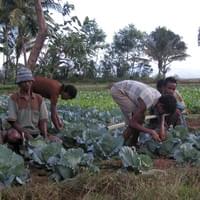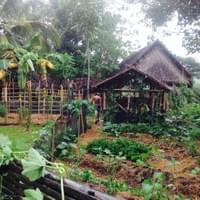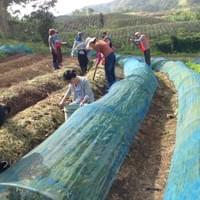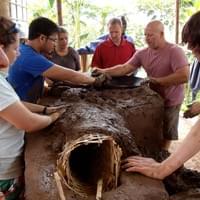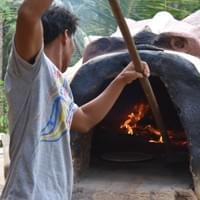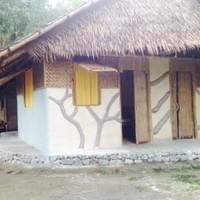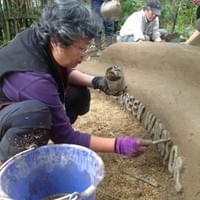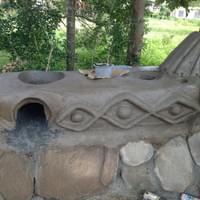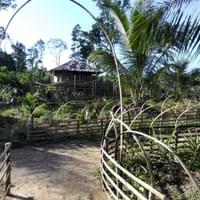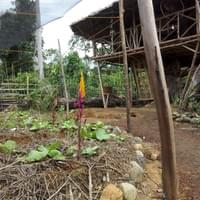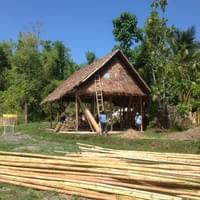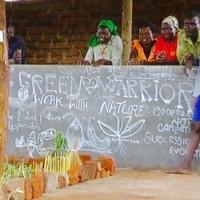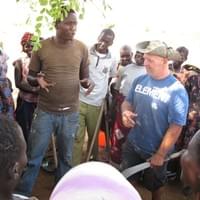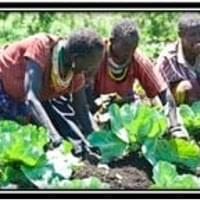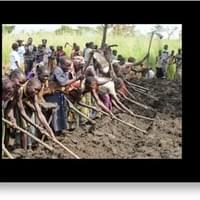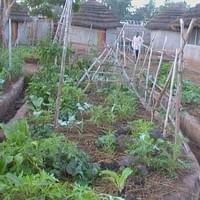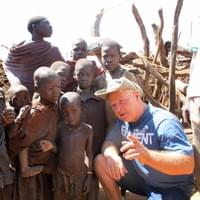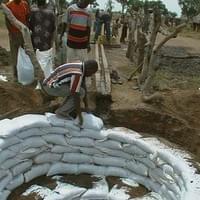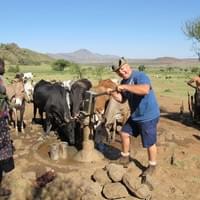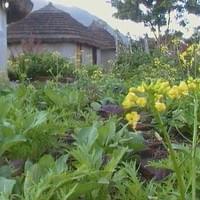


Aid for the Earth and Aid for the people
Aid for the Earth and Aid for the people

Steve Cran
Permaculture Aid Specialist, Permaculture consultant, teacher, climate adaption specialist
Product Showcase
Add details and descriptions to each product.
About Steve Cran
"The only future the human race is a sustainable one. In other futures we don't exist"
Steve Cran is a Permaculture Aid veteran, teacher, social activist, climate change resilience specialist and a very handy guy to have around after a natural disaster. With a 30-year career in Permaculture, Steve has developed effective, sustainable, recovery solutions for communities affected by natural disasters, war, or long-term poverty.
Steve takes on the challenge of assisting people living on the edge of survival, to rebuild their communities. Steve has developed projects in war zones, post disaster zones, poverty zones and in many difficult areas on this troubled planet where most people would not dare go.
“There is a lot written about so called community development but in the field, most of it doesn’t work or it doesn’t last,” says Steve. “Permaculture Aid gets real results by helping the people restore their own community using local resources. They grow their way out of poverty. Conventional aid creates aid-dependency. Permaculture Aid creates self-sufficiency and earth-repair simultaneously”.
Steve focuses on building productive working models and training the trainer from whatever community he’s working with. The best results come from local people training local people to motivate the rest of the community. “The worlds problems grow at an exponential rate so I design projects that solve problems at an exponential rate”.
“Most poverty is brought about when a county’s, city’s, or community’s ecosystem is depleted or destroyed. True sustainability can only be achieved with a fully intact, productive ecosystem. Repairing the ecosystem, as well as the people’s lives, has to be the main aim of a sustainable aid project,” says Steve.
Steve’s first Permaculture Aid work began in 1993 in Wilcannia, NSW, a troubled Aboriginal community in the outback drylands of Australia. Written off as a basket case by the press, Wilcannia had the highest crime rate per capita in 1993 in Australia. Bill Mollison the father of Permaculture, and the NSW government worked together to create the world’s first “Permaculture Project Officer”, Steve Cran, to train the community to solve it’s own problems.
Engaging the unemployed people of Wilcannia and with virtually no external funding, Steve helped the people repair their town. The town got a facelift including a Permaculture Park, the schools gained organic garden plots, and the people began to create sustainable livelihoods. Hundreds of small projects added up to the wave of change that transformed Wilcannia. In 1996 the crime rate had dropped 90% due to that permaculture project. Permaculture Aid had proven its worth.
In 1999 Steve went to war-torn, impoverished Timor Leste to train Timorese in how to adapt permaculture to their culture and solve their poverty and environmental degradation problems. The Timorese has lost 75% of their infrastructure to the conflict there and the country was in a desperate shape. Building Permaculture Field Schools and training trainers Steve formed an effective Permaculture training network, which he co-developed with the Timorese over 5 years. This network continues to grow today.
Steve returned home to Maleny, Queensland, Australia in November 2004 for a well-earned rest. A month later the great Asian tsunami wiped out over 200,000 people in several countries. The world’s largest recorded disaster couldn’t be ignored. Steve’s holiday was over.
Steve’s field experience was called upon to set up a project in Aceh, Indonesia, the epicenter of the earthquake that triggered the tsunami. Working with a Balinese NGO funded by international expats, Steve’s mission was again to bring permaculture education to one of the most difficult places on earth. “This is a tricky project as we have earthquakes every week, possible further tsunamis as well as a protracted guerilla war in our area, not to mention the poverty that was here before the tsunami. The deck is really stacked against these poor people here”, says Steve from Lamsujin, 45 kms Southwest of Banda Ache.
Steve joined IDEP to build the “Greenhand Field School” in Ache, in of the worst affected areas hit by the tsunami. The Greenhand Field School was a training centre to train trainers in sustainable community development best-practice. The Greenhand Field School focused on food security, organic farming, community agro-forestry, appropriate technology, and local solutions for the tsunami survivors. The trainers being trained were mainly Acehnese and the Greenhand Field School was designed so the best trainers run their own facility after 12 months.
In January 2010 Steve was engaged to go to northern Uganda and work with the Karamajong people to restore food security and assist in ending violence and conflict in an area plagued by war and poverty for over 40 years. Aid dependency had robbed the people of the ability to grow their own food and the youth were sucked into a cycle of violence in cattle raiding with the abundant supply of automatic weapons available in East Africa. These youth were known as “the Warriors”.
Working with IOM, International Organization of Migration (UN), Steve trained 75 of the Warriors to become “Green Warriors” and return to their communities and introduce self-sufficiency through permaculture. Steve was able to prove that the Karamajong people were more than capable of growing their own food and the “food-aid” was having a negative impact on their culture and health. Many communities that were written off by the government and the UN produced crops and converted barren land into farmland using basic hand tools and non-hybrid seed. The “Green Warriors” of Karamoja provided previously unheard of new role models for the people of Karamoja. The projects effects continue to this day.
Steve has also conducted projects in Ethiopia, Philippines, the USA, Malaysia and Hong Kong. In each country he teaches and in each country he learns. “I’m always the teacher and the student combined,” Steve says. “Every culture has it’s best-practices and I share what I learn with all cultures I work with.”
Based in Australia, Steve Cran is now consulting and conducting training throughout Southeast Asia on Permaculture-Aid field skills as well as training the trainer.
Steve is also working as an advisor to create resilience strategies for communities in the face of climate change. Currently Steve is developing a system to combat the damage from climate events. Climate-Change Adaption Technology or C-CAT, trains people and communities how to build resilience into their homes, farms and communities. Apart from training people, Steve has a creative intellect for solving problems and designing sustainable systems that can handle the challenges of climate change events in our current world. Steve believes he can stimulate that same creativity in people through his training.
Transferring his hard won skills to young people wanting to make a difference in this world, Steve’s courses are challenging and instructive. “These are the skills in the field you can’t learn from books”, says Steve. “Getting your hands in the soil and working in real live situations drives home the training to create the kind of people that can make a real impact in the field of aid”. In the world as it as at present we are seeing disasters and climate change events of a magnitude never before seen in recorded history. Every country is going to need Permaculture Aid at this rate”
He adds, “The aid industry is starving for good field technicians and we aim to fill that void. From building a base camp to planting a community food security garden this training will give anybody entering the aid industry a head start.”
“My current aim is to train the trainer and work with the youth. Our youth have been weakened by poor nutrition, low quality education and the over supply of artificial information. Addicted to technology our youth have become useless and weak as well as dim witted. It’s not the old people that will save our world. Given the right skills, it will be the youth who regenerate our planet. World governments are failing the youth in regards to education. It’s a bad recipe for the future generations. Our hands-on training methods restore the youth’s mind, body and soul and gives them a toolbox to fix the worlds problems.”
Stories from the front line of Permaculture Aid
by Steve Cran
October 17, 2017The vultures seemed to know it is a funeral. I watch the huge turkey sized birds drop out of the sky and land under the big shady tree to watch the mourners. One of the Green Warriors has died of a mystery illness. He was definitely one of the best we’ve trained here in Abim. First he felt...October 17, 2017In Aceh, the 2004 Tsunami epicentre, our Permaculture field school is located close to the jungle. Since the war stopped a few months ago we can now hear chainsaws buzzing away, cutting into the last forest where wild Asian elephants live. Somehow the army and the rebels have teamed up to...October 17, 2017Green Warriors in Ethiopia 2011 The word got around through my Balinese friends I was going to Utopia (I wish!). I had to correct the gossip and explain I was actually on my way to Ethiopia, in Africa, not Utopia. My mission is to run a month long Permaculture Aid Course (PAC). I board the...Services Provided
Permaculture is the toolbox we can solve the world's problems with
Permaculture Climate-Change Adaption Technology Specialist
Many people worry about what climate change is and what can we do to mitigate the effects or survive the big events.
At present we live in the "Age of Deception" where we are overloaded with artificial knowledge or simply too much data. Since the birth of the internet we have access to more data than we could possibly digest in many lifetimes just on our cell phones alone. This gives people the false reasoning that they are more informed and are somehow smarter. I can see the opposite occurring. This information overload has tariffed our ability to reason. As a race we are being systematically dumbed-down and kept in a state of fear to keep us under control.
As we move into the "Age of Awakening" people are raising their consciousness and using their intuition to discern truth from fiction and take instruction from their higher self rather than the narrative pushed through social media. Our minds are breaking out of the 3-D world construct into new dimensional awareness.
My personal belief is that Climate Change is actually Earth changes due to our planet having a significant portion of her ecosystems damaged and polluted. The Earth, like us, has an immune system and currently there is an immune response in progress. Many places on our planet are changing due to the flow on effect of our planet moving weather systems, tides and materials around to compensate for the damage inflicted by human activity.
Simply put we can create a drought by killing the trees. We can also modify a desert's weather system by planting many thousands of trees. Nature will respond either way to our efforts. If you are experiencing floods, look upstream and see if your local catchment is forested. Forests hold water and a deforested catchment leads to flooding downstream. This is all common-sense stuff but of course common-sense is no longer common it seems.
We can mitigate and adapt to climate change activities. We can also be trained on how to respond to events before and after they happen. If you have no self sufficiency skills and you obtain all your food from a shopping centre, then most likely you will suffer again and again from any climate event. You may even perish.
If you know what to do and how to read the situation then you will not only survive but thrive in the process. As the Earth changes there are new opportunities for those who can read the signs. Climate change will bring about new ways of designing our houses, communities and food systems. Climate change will wean us off the current brown technology that chews up the Earths resources and leaves us with a bleak future. In it's place we will have new green technology and a culture of repairing the ecosystems and preserving the natural environment our planet has given us.
I am now focusing my permaculture activities into helping people adapt to climate events and prepare themselves and their communities for what may come. An important part of this training is raising our consciousness so we can see through the deception and awaken. We always knew that at some point our destructive activities towards our planet would bring repercussions. We have certainly reached that point.
The CCATS course or Climate Change Adaption Specialist course is the first permaculture training on how to adapt and mitigate climate events. It is a 14-day live-in course, run on our eco-farm sites in Australia and the Philippines. Dont be afraid, be prepared instead. Watch for the next course near you.
Permaculture trainer of the trainer
The training of the trainer is one the most important issues in Permaculture right now because the world is in dire need of effective Permaculture trainers. Steve offers a 2-year mentorship program starting with a 10-week hands-on internship. Steve will work closely with an intern to train him/her in all aspects of practical permaculture. A teacher has to know permaculture before they can teach it. From there the trainee will be farmed out to various projects as a novice trainer to gain experience from experienced permaculture teachers and practitioners and co-teach on Permaculture workshops and courses.
The students will also be given a 2-week “Train the trainer” module on teaching styles and techniques. After 2 years the cadet teacher is qualified to co-teach for a further 2 years. After 2 years of co-teaching the teacher can now open their own Permaculture Field School and branch out on their own or join a guild of trainers.
To become a Climate Change Adaption Technology Specialist we run firstly a 2-week liven course and for those who want to enter this field professionally we offer a 2 year apprenticeship. The first 10 weeks of this diploma course are spent as a field apprentice on one of our sites. Once the student has successfully completed the 10 week field section they then travel to one of our many field school sites and develop projects to test their skills. Some of these sites are actual farms or ongoing aid projects. I believe to teach permaculture the teacher must know how to do permaculture not just memorise data from a book.
The 10-week CCATS apprenticeship is also available as a stand alone course for those who may already have experience or want to get stuck into climate projects without a full diploma. We can also adapt our course to people with specialist skills or accrued experience in the field.
These courses will be run through our new facilities at the CAP or Centre of Advanced Permaculture. For course details email me at green.warriorsteve@gmail.com
Permaculture teacher
Steve is a permaculture teacher who has developed a 50% hands-on training system. Students trained by Steve learn by doing. Steve developed this system after observing many students of Permaculture Design Certificate courses went home with a lot of data but still didn’t know how to begin implementing actual permaculture systems. Steve’s Green Warrior Permaculture students return home with all the skills needed and get real results in the field with this type of training.
Green Warrior Permaculture training especially is suited to today’s youth that are overloaded with Internet information and people who need to get their hands into the earth to learn. Students are always amazed at what they achieve in the field on Steve’s courses. Steve conducts Permaculture Design Certificate Courses (PDC) several times a year plus Steve runs Permaculture Aid Certificate courses once a year. Steve also trains in-house interns and apprentices as well as youth groups where ever he operates from.
Permaculture Aid Specialist
Steve has pioneered the “5 Rings of Sustainability” as a step-by-step strategy used in rebuilding a community after a war, natural disaster, or a community completely overwhelmed by poverty. Steve can create a plan to rebuild the community’s eco-systems, food security, and economy where the people “grow their way out of poverty”. The aim is to make the community resilient and self-sufficient, not aid-dependant.
With today’s climate change events happening in almost every region of the planet it seems inevitable Permaculture Aid will be needed in every community one day soon. Climate Change Resilience can be obtained before a disaster. Most communities are slow to grasp what’s really needed to adapt to the challenges facing them in today’s climate. Steve offers strategic planning and education before a disaster. Unfortunately at present he does most of his training after a disaster because the majority of people don’t want to change unless they are faced with a huge crisis.
Project Design and Project Evaluation
Many governments, organizations or charities want to create aid projects or social activist programs to help communities adapt to climate change events or recover from poverty or some natural disaster. Steve can help design an effective project that will get solid results in the field and also be cost effective. With 27 years field experience Steve has learned the best-practice ways to design and implement these types of projects.
Steve can also evaluate existing projects for those organizations or groups who want an honest professional appraisal of how their project is performing in reality. This is important where one group is channeling money and resources into a remote location and needs to know the real story on what’s happening in the field. Steve can also help design a strategy where a program or project is failing or has fallen short of its intended outcomes.
Permaculture Designer
Permaculture design can solve most of the world’s problems. From retrofitting urban waste areas to replanting denuded land into productive forests, a good plan with a design can get real results that are seemingly impossible. Steve has designed large-scale organic polyculture farms and forestry systems in many countries. Some designs are to repair damaged ecosystems and some designs are to socialize the idea that humans should becomes partners with Mother Nature. Steve has an intuitive creative ability to come up with an effective strategy for almost any situation. The most important factor in Permaculture design is the people. Without people a design is worthless. Steve’s initiatives blend people and their permaculture designs into a symbiotic harmony.
Drop Steve a message

